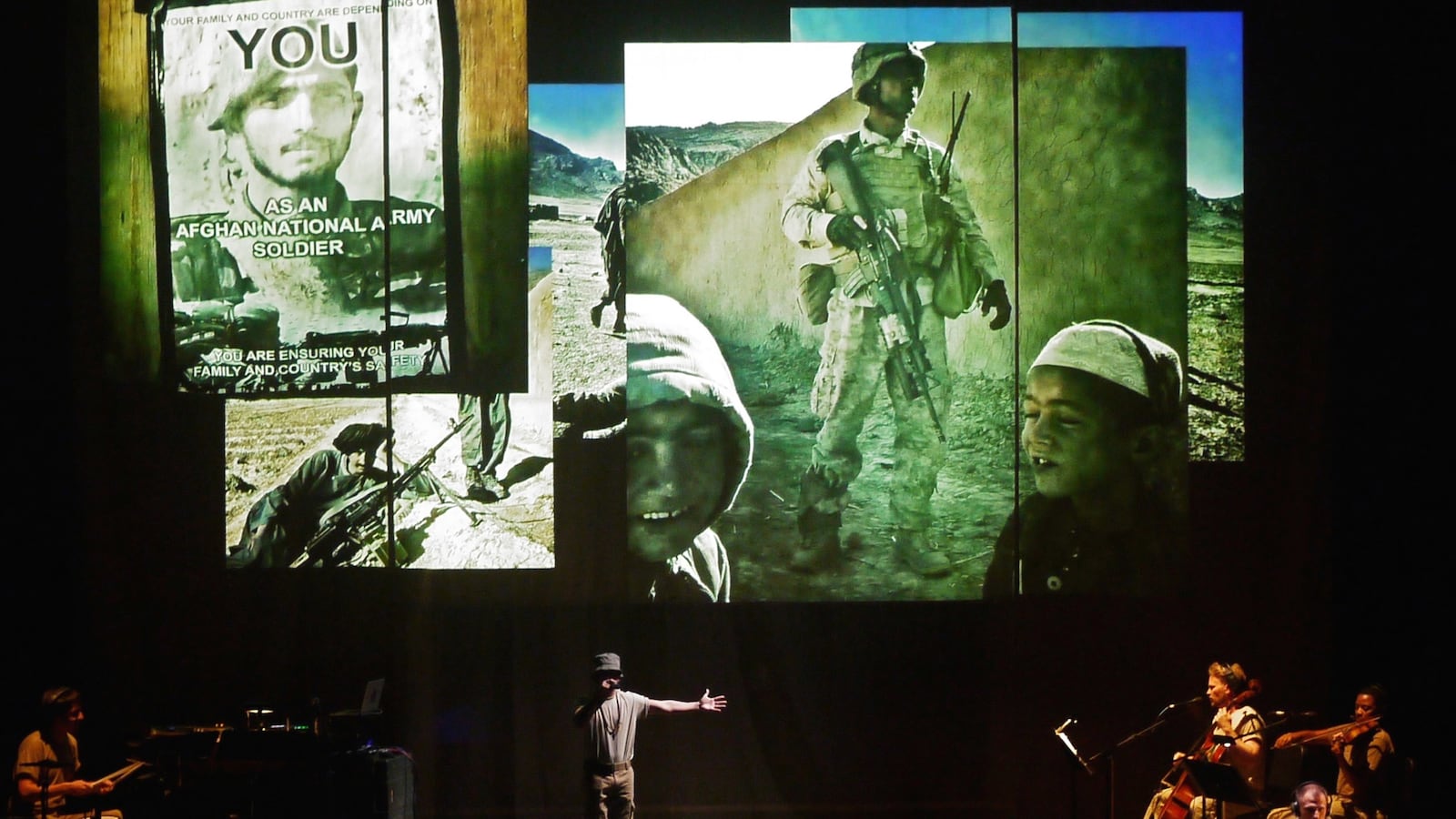Although a significant portion of Basetrack Live takes place in Afghanistan, it has surprisingly little to say about that country or its residents. That is, except for one distinct moment.
At about twenty-five minutes in to the multimedia theater performance at the Brooklyn Academy of Music, Marines appear on a screen to describe their interactions with Afghan people. One Marine, faced with constant deception and swindling by Afghan civilians, says he began to think of all Afghans as terrorists.
Then, amid color-saturated images of suspicious Afghans in turbans, as Marines cheer the detonation of a Javelin missile inside an Afghan building, a cast musician breaks into a hip-hop musical number.
Put your eyes down, son
Don’t be lookin at me
And don’t you make a fuckin sound.
Up until that instant, it felt like this was something so long awaited in the post-9/11 veteran community: something faithful and precise, a work of art better than The Hurt Locker toward which veterans could direct their concerned family and friends.
But after the musical number, it’s clear that this isn’t the whole story: there is no mention of what the Marines were doing in Afghanistan, and the only facts conveyed about Afghans are that they live in mud huts and that most Marines seem to hate them. For a veteran seeking answers, that particular moment made Basetrack Live feel more like West Side Story in MARPAT camouflage.
Basetrack Live is the story of young Americans in war. It’s concerned solely with the effects of combat on a Marine infantry unit and their loved ones back home. And to its credit, it’s a faithful portrayal – though I was not a Marine and was deployed to the other side of the country, there are profound similarities between these men’s experiences and my own.
This makes for an unusual, and risky, subject for a musical stage show – one with origins as a kind of citizen journalism project. During 1st Battalion, 8th Marine Regiment’s deployment to Afghanistan in 2010, a group of embedded journalists documented the experience with iPhones. The result was a kind of stylized, Instragram documentary of what had already become the longest war in American history.
At the same time, the Marines and spouses in the unit shared day-to-day information on a group Facebook page. These images, videos and messages became a lifeline between two worlds and a stark record of the distance between them. On the one side, daily family struggles in the US; and in the other world, daily life-or-death combat operations during the Afghan Surge.
The show employs two stage actors to depict its protagonist AJ Czubai, a combat Marine, and his wife Melissa’s experience. Tyler La Marr, the actor who plays AJ, is himself a Marine veteran of Iraq. Melissa, portrayed with earnest desperation by Ashley Bloom, gives on-screen Skype interviews where she opens up about her difficulties during AJ’s training and his dark presence upon returning from combat.
Once a caring father and husband, AJ becomes a wreck – he drinks incessantly, he’s violent and irritable, and his sole civilian-world excitement comes from buying and cleaning guns. He is struggling with--and losing--a fight he cannot explain.
These are the troubled veteran tropes that we already expect, but La Marr’s performance captures the contradictions of young infantrymen and brings AJ to life. He is at once apolitical and fervent, disciplined and vulgar; when he reminisces about the death of his best friend in a roadside bomb blast, there’s a singular kind of stifled horror in La Marr’s face unique to those haunted by the ghosts of combat.
He can’t verbalize what he feels, so he simply shuts up on the verge of tears. For her part, Melissa shows the frustration and powerlessness of a woman devoted to a man she no longer understands – or trusts.
Throughout the show, an on-screen band provides a score that ranges from Brian Eno-esque ambience to what you might call orchestral nü-metal. And then, of course, there’s the rap song, which was gratuitous and seemed to me a misstep given the somber elegance of the remaining soundtrack.
The on-stage musicians perform Basetrack Live with both instruments and samples, cueing up videos and sounds in real time. What results is a kind of mashup concert, a virtuoso mixed-media DJ set tuned to a keen emotional pitch.
But for all the virtuosity on display, the performance hangs on the intentional decision to depoliticize a war that has outlasted decades and presidents. Watching the show, it seemed to me that I was listening to a beautiful and precise stereo recording that was missing its left audio track.
Aside from one passing mention of the Surge, there was no explanation as to why the Marines were in Afghanistan in 2010, or in the thirteen years of war that lasted until the Marine Corps’s mission ended last month.
The performance instead focuses on the personal experience of fighting and the long shadow it casts. That’s a worthy subject, but if it stops us from asking what purpose the fighting served, it has as much significance as the ubiquitous bumper sticker yellow ribbon, or an anonymous thank-you in an airport. It’s gratifying for the few minutes before it’s forgotten entirely.
In one particularly affecting monologue, AJ discusses his frustration and troubles upon returning to the US. The infantryman, he says, has pride because:
“We’ve raised our hands and said, 'Take Me, America. I am willing to kill for you. I am willing to sacrifice my limbs for you. I will come home to America scarred and disfigured for you. I will be the first to die. For you.’”
No one can doubt that these men have suffered because of what they did or couldn’t do. AJ’s monologues suggest that he felt obligated to make this sacrifice. And, perhaps because I am myself a former Army infantryman and an Afghanistan veteran, I worry that this sacrifice – and the death it entailed – is taken for granted in American politics.
It is this kind of abstraction that leads to more mythology, more heroic narratives, more undertones of patriotic martyrdom. At times like this, it would serve us well to remember the words of another Marine, the author Gustav Hasford, in his 1987 essay, Vietnam Means Never Having to Say You’re Sorry:
“It's not enough to touch the names on the Black Wall and remember. Our finest tribute to our fallen dead would be to convince their sons that we were not Rambo and neither are they.”
Basetrack Live seems to indicate that a shoulder shrug has become the sole remnant justification for the war in Afghanistan circa 2014, a war in which an entire generation of veterans performed and submitted to violence in our country’s name.
Out of a desire to create dialogue between disparate parties, the show avoids this question of “why?” entirely. That is a generous and diplomatic approach. However, if you ask yourself the same questions as I do, you might also exit the theater the same way that I did: dazzled and impressed, with a profoundly empty feeling in your gut.
Basetrack Live opened November 11 at the Brooklyn Academy of Music and runs until November 15. Tickets are available here.






